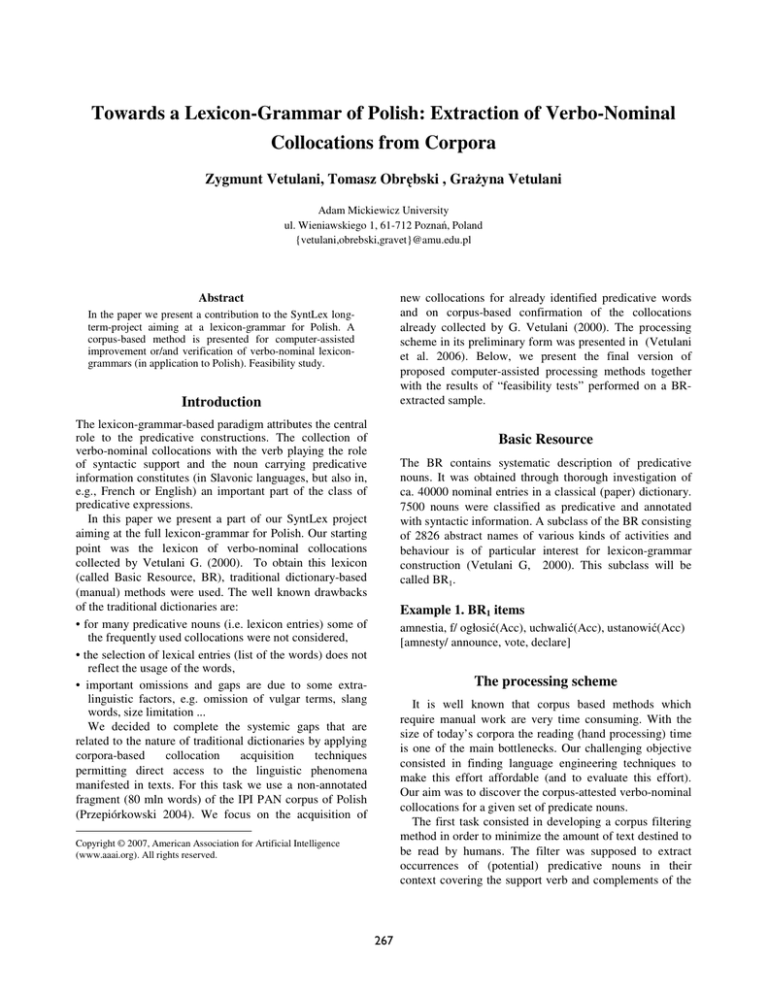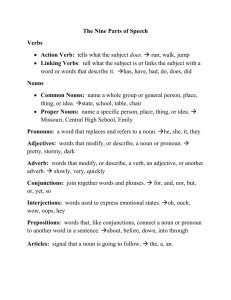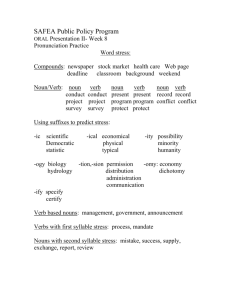
Towards a Lexicon-Grammar of Polish: Extraction of Verbo-Nominal
Collocations from Corpora
Zygmunt Vetulani, Tomasz Obrębski , Grażyna Vetulani
Adam Mickiewicz University
ul. Wieniawskiego 1, 61-712 Poznań, Poland
{vetulani,obrebski,gravet}@amu.edu.pl
new collocations for already identified predicative words
and on corpus-based confirmation of the collocations
already collected by G. Vetulani (2000). The processing
scheme in its preliminary form was presented in (Vetulani
et al. 2006). Below, we present the final version of
proposed computer-assisted processing methods together
with the results of “feasibility tests” performed on a BRextracted sample.
Abstract
In the paper we present a contribution to the SyntLex longterm-project aiming at a lexicon-grammar for Polish. A
corpus-based method is presented for computer-assisted
improvement or/and verification of verbo-nominal lexicongrammars (in application to Polish). Feasibility study.
Introduction
The lexicon-grammar-based paradigm attributes the central
role to the predicative constructions. The collection of
verbo-nominal collocations with the verb playing the role
of syntactic support and the noun carrying predicative
information constitutes (in Slavonic languages, but also in,
e.g., French or English) an important part of the class of
predicative expressions.
In this paper we present a part of our SyntLex project
aiming at the full lexicon-grammar for Polish. Our starting
point was the lexicon of verbo-nominal collocations
collected by Vetulani G. (2000). To obtain this lexicon
(called Basic Resource, BR), traditional dictionary-based
(manual) methods were used. The well known drawbacks
of the traditional dictionaries are:
• for many predicative nouns (i.e. lexicon entries) some of
the frequently used collocations were not considered,
• the selection of lexical entries (list of the words) does not
reflect the usage of the words,
• important omissions and gaps are due to some extralinguistic factors, e.g. omission of vulgar terms, slang
words, size limitation ...
We decided to complete the systemic gaps that are
related to the nature of traditional dictionaries by applying
corpora-based
collocation
acquisition
techniques
permitting direct access to the linguistic phenomena
manifested in texts. For this task we use a non-annotated
fragment (80 mln words) of the IPI PAN corpus of Polish
(Przepiórkowski 2004). We focus on the acquisition of
Basic Resource
The BR contains systematic description of predicative
nouns. It was obtained through thorough investigation of
ca. 40000 nominal entries in a classical (paper) dictionary.
7500 nouns were classified as predicative and annotated
with syntactic information. A subclass of the BR consisting
of 2826 abstract names of various kinds of activities and
behaviour is of particular interest for lexicon-grammar
construction (Vetulani G, 2000). This subclass will be
called BR1.
Example 1. BR1 items
amnestia, f/ ogłosić(Acc), uchwalić(Acc), ustanowić(Acc)
[amnesty/ announce, vote, declare]
The processing scheme
It is well known that corpus based methods which
require manual work are very time consuming. With the
size of today’s corpora the reading (hand processing) time
is one of the main bottlenecks. Our challenging objective
consisted in finding language engineering techniques to
make this effort affordable (and to evaluate this effort).
Our aim was to discover the corpus-attested verbo-nominal
collocations for a given set of predicate nouns.
The first task consisted in developing a corpus filtering
method in order to minimize the amount of text destined to
be read by humans. The filter was supposed to extract
occurrences of (potential) predicative nouns in their
context covering the support verb and complements of the
Copyright © 2007, American Association for Artificial Intelligence
(www.aaai.org). All rights reserved.
267
noun (see (Vetulani Z. et al. 2006) for a discussion of
alternative pattern forms). The filtering consisted in
extraction of concordances for predicative nouns,
following the general pattern:
<verb> + <predicate_noun> + [<noun> + [<noun>] ]
Additionally, prepositions before nouns, the negation
particle (“nie”) before the support verb, the reflexive
pronoun “się” before and after the verb, as well as the
adjectival modifiers before predicate noun were admitted.
Naturally, only some of the extracted expressions
contain bona fide predicative nouns. In consequence, only
a part of verbs accompanying the noun could be classified
as playing the role of a support verb.
The distinction of predicative and non-predicative use
could not be made automatically. Therefore the output of
the filtering procedure had to be scanned manually.
Experiment Results
Effort estimation. On the basis of the experiment we may
evaluate the total reading effort at ca 4 man-month under
the assumption that each text is being read by one
lexicographer. Considering that human expertise (language
intuition) is involved, application of two (or more for some
steps) human experts is advisable. The total cost of the
project (without considering elaboration of processing
tools) should be estimated at 5-10 man-months.
Resource extension. The experiment has shown practical
usefulness of the methods resulting in interesting
discoveries of collocations not attested in the BR. On the
basis of the experiment we estimate that the final set of
collocations will be twice as large as the initial one (BR).
The following example shows the result of the procedures
described in the paper as applied to the predicative noun
“ambicja” (ambition).
Example 3. BR entries
Feasibility Experiments (5%-sample based)
(i). The entry “ambicja” in the Basic Resource
We will describe here in some detail an experiment aimed
at estimating the effort necessary to apply the procedure to
the BR as well as estimating the results possible to obtain
with the adopted approach. The experiment was conducted
on a 5%-sample of BR1.
Step 1. Application of the filter patterns described
above. The resulting file A had the size of 61250 lines
(1072 pages, 235742 words).
Step 2. Deletion of the right contexts of the predicate
noun, transformation of verbs into the infinitive form and
elimination of repetitions. The resulting file B contains
27393 lines (452 pages, 82 464 words).
Step 3. Deletion of all the elements except the noun and
the verb, transformation of the noun into its base form and
elimination of repetitions. The resulting file C contains
12628 lines (210 pages, 12 485 words).
Step 4. Manual processing of the file C in order to
discover collocation candidates.
Step 5. For the retrieved collocation candidates the
(partial) context has been resumed (from B). The resulting
file B' contains 4324 lines (72 pages, 12 783 words).
ambicja, f/ mieć(Acc)/N1(Gen), mieć(Acc,pl)/MOD
(ii). The entry “ambicja” including collocations retrieved in
the corpus (in italics)
ambicja, f/ mieć(Acc)/N1(D), mieć(Acc,pl)/MOD,
posiadać(Acc,pl)/MOD, ujawniać(Acc,pl)/MOD,
zaspokoić(Acc)/N1(Gen), zaspokoić(Acc,pl)/MOD,
zaspakajać(Acc)/N1(Gen),
zaspakajać(Acc,pl)/MOD
Notice that the method described above as a way to
improve a resource obtained within different
methodological paradigm (dictionary-based) may be used
to develop collocation dictionary from scratch (for the
initially pre-selected set of predicate nouns).
Acknowledgements
This research is partially covered by Polish Governement
research grant R00 028 02 for the period 2006-2009.
References
Przepiórkowski, A. 2004. The IPI PAN Corpus, IPIPAN,
Warszawa.
Vetulani, G. 2000. Rzeczowniki predykatywne języka
polskiego (Predicate Nouns of Polish; in Polish), Wyd.
Nauk. UAM, Poznań.
Vetulani, Z., Obrębski, T. and Vetulani, G. 2006. Syntactic
Lexicon of Polish Predicative Nouns. In: N. Calzolari (ed.),
Fifth International Conference on Language Resources
and
Evaluation,
Genoa,
Italy,
24-26.05.2006,
(Proceedings), ELRA, Paris, 1734-1737.
Example 2. Samples of files A, B, C
A:
ambicja
16
ma
2
zaspokoi
B:
ambicja
35
<mieć>
8
<zaspokoić>
C:
ambicja
79 mieć
9 zaspokoić
[ambicje]
[ambicje] kolejnych koalicji
[ambicje]
[ambicje]
268









